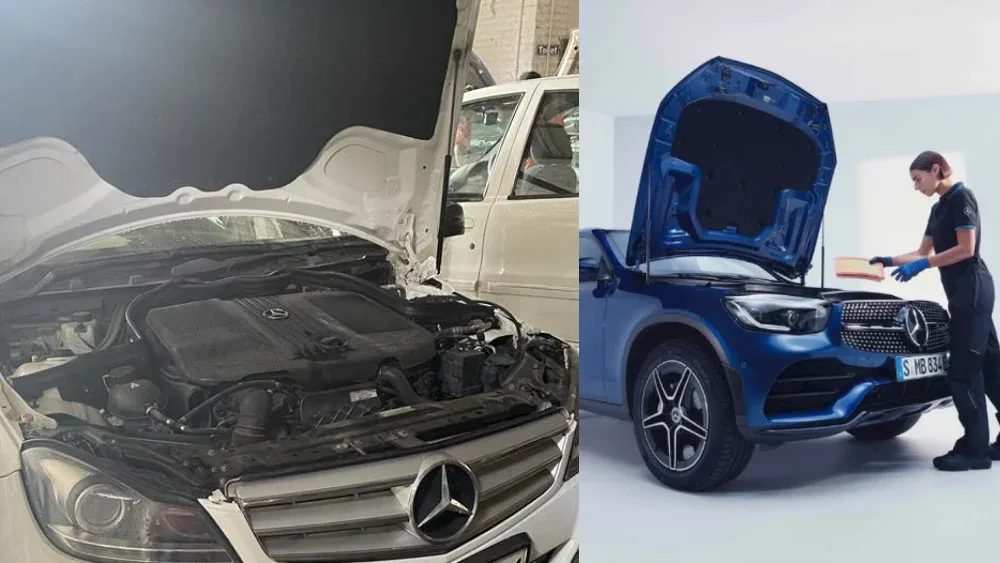Learn about Mercedes-Benz car service prices, including factors that affect costs, maintenance schedules, and tips for managing service expenses to keep your car running smoothly.
Table of Contents
Introduction
Mercedes-Benz car service prices reflect the brand’s dedication to quality, performance, and advanced engineering. As a luxury automobile manufacturer, Mercedes-Benz offers a range of maintenance and repair services tailored to preserve the exceptional standards of its vehicles. The cost of servicing depends on factors such as the car model, service type, and location. Regular maintenance services include oil changes, brake inspections, and software updates, while more comprehensive tasks may involve diagnostics or part replacements. Opting for authorized service centers ensures the use of genuine parts and expert care, ensuring your Mercedes-Benz stays in peak condition.

Factors Affecting Mercedes-Benz Car Service Price
Model and Variant
Different Mercedes-Benz models have unique service requirements. Premium or AMG variants often involve higher costs due to specialized components and advanced engineering.
Age and Mileage
Older vehicles or those with high mileage may need extra maintenance or replacement of worn parts, which can increase overall service expenses.
Type of Service
Routine maintenance, such as oil changes or brake pad replacements, is more affordable compared to extensive services like engine or transmission repairs.
Genuine Parts and Labor
Opting for authentic Mercedes-Benz parts and certified technicians ensures quality and reliability but can be costlier than using aftermarket alternatives.
Location
Service costs vary depending on the region due to differences in labor rates, taxes, and part availability.
Service Packages
Mercedes-Benz offers prepaid service plans that can lower long-term maintenance costs but require an upfront payment.
Additional Repairs
Unforeseen issues identified during routine checks, such as software updates or component repairs, can lead to added expenses.
Mercedes-Benz A Service and B Service Costs
Mercedes-Benz offers two primary types of scheduled maintenance: A Service and B Service. These services are designed to ensure optimal performance and longevity of the vehicle. Their costs vary depending on the model, location, and other factors.
A Service
A Service is the first scheduled maintenance, typically required after the first 10,000 miles or one year, and then every 20,000 miles thereafter.
What’s Included:
- Oil and filter replacement using genuine Mercedes-Benz parts.
- Inspection and adjustment of fluid levels.
- Tire pressure check and correction.
- Brake component inspection.
- Resetting the maintenance counter.
Cost: A Service typically ranges from $200 to $400, depending on the model and region.
B Service
B Service is performed after the first 20,000 miles or two years, and then every 20,000 miles subsequently. It includes all the tasks from A Service, with additional checks and replacements.
What’s Included:
- Oil and filter replacement.
- Inspection and adjustment of fluid levels.
- Brake fluid exchange.
- Cabin air filter replacement.
- Comprehensive vehicle inspection.
- Tire pressure and wear check.
Cost: B Service generally costs between $400 and $800, reflecting the additional tasks and parts involved.
Factors Influencing Costs
- Vehicle model and variant.
- Regional labor rates and taxes.
- Additional repairs or replacements identified during the service.
Common Maintenance Costs for Mercedes-Benz Cars
Owning a Mercedes-Benz comes with the responsibility of regular maintenance to ensure the vehicle’s longevity, performance, and safety. While costs may vary based on the model, location, and type of service, here are some common maintenance expenses associated with Mercedes-Benz cars.
Oil Changes
Regular oil changes are essential to keep the engine running smoothly.
Cost: Typically ranges from $150 to $300, depending on the model and oil type used.
Brake Service
Brake pad and rotor replacements are crucial for safe driving.
Cost: Brake pad replacement costs around $250 to $400 per axle, while rotor replacement may add $400 to $600.
Tire Maintenance
Tire rotations, balancing, and replacements are necessary to ensure proper handling and safety.
Cost: Rotation and balancing typically cost $50 to $100, while new tires range from $800 to $1,500 for a set.
Battery Replacement
Mercedes-Benz vehicles often use advanced batteries that may require special handling.
Cost: Battery replacement costs can range from $200 to $500.
Transmission Service
Transmission fluid changes and other related maintenance ensure smooth gear shifts.
Cost: Transmission service typically ranges from $300 to $600.
Scheduled Services (A and B Services)
Routine maintenance as outlined in the Mercedes-Benz schedule keeps the car in peak condition.
Cost: A Service costs $200 to $400, while B Service ranges from $400 to $800.
Air Filter and Cabin Filter Replacement
Replacing filters improves air quality and engine efficiency.
Cost: Air filter replacement costs around $50 to $150, and cabin filter replacement is $75 to $200.
Suspension and Alignment
Regular checks and adjustments to the suspension and alignment ensure a smooth ride.
Cost: Alignment costs range from $150 to $300, while suspension repairs vary widely based on the issue.
Diagnostic Checks and Software Updates
Advanced diagnostic tools are used to identify and resolve issues, often requiring software updates.
Cost: Diagnostics typically cost $150 to $250, with additional charges for updates or repairs.
Additional Repairs
Costs for unexpected issues, such as engine or electrical repairs, can vary widely but may be higher due to the complexity of Mercedes-Benz vehicles.
Long-Term Costs of Owning a Mercedes-Benz
Owning a Mercedes-Benz offers a premium driving experience, but it comes with long-term costs that reflect the brand’s luxury and advanced engineering. Understanding these costs can help owners plan for the lifetime expenses of maintaining and enjoying their vehicle.
Scheduled Maintenance
Routine services such as oil changes, brake replacements, and A and B Services are essential for the vehicle’s reliability. Over the years, these scheduled services can cost several thousand dollars, depending on the model and driving habits.
Repairs and Part Replacements
As the vehicle ages, components like the transmission, suspension, and electrical systems may require attention. Advanced technology and high-quality parts often make repairs more expensive compared to non-luxury brands.
Tires and Batteries
High-performance tires and advanced batteries designed for Mercedes-Benz vehicles typically need replacement every few years. These costs can add up, especially for AMG models or vehicles with specialized components.
Fuel Costs
Mercedes-Benz models, particularly those with larger engines or AMG variants, often require premium fuel. Over time, this contributes to higher fuel expenses compared to standard vehicles.
Insurance Premiums
Insuring a luxury car like a Mercedes-Benz is generally more expensive due to higher repair and replacement costs. Premiums depend on the model, location, and driver profile.
Depreciation
While Mercedes-Benz vehicles hold value better than many others in the luxury segment, depreciation remains a significant long-term cost. Maintaining the vehicle through regular service can help minimize this.
Extended Warranties and Service Plans
To offset unexpected repair costs, many owners invest in extended warranties or prepaid service plans. These plans have upfront costs but can provide financial predictability over the vehicle’s life.
Customization and Upgrades
Optional features, upgrades, and aftermarket accessories tailored to Mercedes-Benz vehicles often come at a premium price.
Taxes and Registration Fees
Luxury vehicles like Mercedes-Benz often attract higher registration fees and taxes, which can add to long-term ownership expenses.
Tips to Reduce Mercedes-Benz Service Costs
Maintaining a Mercedes-Benz doesn’t have to break the bank. With proper care and strategic decisions, you can reduce service costs while ensuring the longevity and performance of your vehicle. Here are some tips to help lower maintenance expenses:
Follow the Maintenance Schedule
Adhering to the recommended service intervals for A and B Services helps prevent costly repairs by addressing minor issues early.
Use Authorized Service Packages
Investing in prepaid maintenance plans from Mercedes-Benz can save money over time compared to paying for individual services.
Choose Genuine Parts Wisely
While genuine Mercedes-Benz parts ensure reliability, consider aftermarket options from reputable brands for non-critical components to save costs.
Maintain Your Vehicle Regularly
Simple tasks like checking tire pressure, fluid levels, and keeping the vehicle clean can prevent unnecessary wear and tear, reducing repair costs.
Compare Authorized Service Centers
Mercedes-Benz service centers may charge different rates depending on location. Comparing prices among authorized centers can help you find the best deal.
Avoid Unnecessary Repairs
Have a trusted mechanic or service advisor confirm the necessity of recommended repairs to avoid paying for services that may not be urgent.
Drive Responsibly
Smooth driving habits reduce wear on brakes, tires, and the engine, which can lead to fewer repairs and replacements.
Take Advantage of Warranty Coverage
If your car is still under warranty, ensure you address any covered issues promptly to avoid paying out of pocket for repairs.
Monitor Recalls and Free Services
Stay informed about manufacturer recalls or complimentary service campaigns, which can address specific issues at no cost.
Invest in Diagnostic Tools
Basic diagnostic tools can help identify minor issues early, allowing you to address them before they escalate into expensive repairs.
Avoid Delays in Maintenance
Procrastinating on routine services often leads to compounded issues, increasing repair costs in the long run.
Authorized Mercedes-Benz Service Centers vs. Local Mechanics
When it comes to servicing your Mercedes-Benz, you have two main options: authorized service centers or local mechanics. Each has its advantages and considerations, and understanding the differences can help you make an informed decision based on your needs and budget.
Authorized Mercedes-Benz Service Centers
Expertise and Specialization:
Authorized service centers are staffed with technicians who are trained specifically on Mercedes-Benz vehicles. They are equipped with the latest diagnostic tools, software updates, and access to genuine Mercedes-Benz parts. This ensures that your vehicle receives the best care, especially for complex or high-tech systems.
Genuine Parts:
Authorized centers use only genuine Mercedes-Benz parts, which guarantees that replacements meet the brand’s strict quality standards. These parts are designed for optimal performance and longevity, which can help preserve the car’s value over time.
Warranty Protection:
Servicing your Mercedes-Benz at an authorized center ensures that your warranty remains intact. Many manufacturer warranties require servicing to be done by certified technicians using approved parts to avoid voiding coverage.
Cost:
Authorized service centers generally have higher labor rates compared to local mechanics, due to their specialized expertise, use of genuine parts, and access to the latest technology. However, they may offer prepaid service packages or extended warranties that can reduce long-term costs.
Advanced Repairs and Software Updates:
For complex repairs, especially related to the car’s advanced technology or electronics, authorized service centers have the advantage. They can perform software updates and diagnostics that are specific to Mercedes-Benz models.
Local Mechanics
Cost-Effective:
Local mechanics typically have lower labor costs, which can result in cheaper overall service bills. If your vehicle doesn’t require specialized or high-tech repairs, local mechanics can be a more affordable option for basic maintenance like oil changes, tire rotations, or brake services.
Personalized Service:
Local mechanics often offer more personalized attention. They may take the time to explain the repairs in detail or offer flexible scheduling to fit your needs. For customers who value a close working relationship with their mechanic, this can be a significant benefit.
Familiarity with Common Issues:
While local mechanics may not have access to the latest Mercedes-Benz-specific diagnostic tools, many are familiar with common issues and can perform basic repairs effectively, especially for older models or vehicles that don’t require advanced technology.
Parts and Quality:
Local mechanics may use aftermarket parts, which are generally cheaper than genuine parts from the manufacturer. While these parts can perform well, they may not meet the same durability standards as those provided by Mercedes-Benz. Some lower-cost parts may not last as long or may affect the vehicle’s resale value.
Limited Access to Specialized Tools:
Local mechanics may not have access to the advanced diagnostic equipment or software that authorized centers use. This can be a disadvantage for handling complex repairs or issues related to the vehicle’s electronics or systems that are unique to Mercedes-Benz vehicles.
Which Option is Right for You?
- For Basic Maintenance and Older Models: If your vehicle is older, out of warranty, or doesn’t require specialized service, a local mechanic may be a cost-effective choice for basic tasks like oil changes, tire replacements, and brake services.
- For Newer Models or Complex Repairs: If you own a newer Mercedes-Benz model, especially one with advanced technology, it’s generally recommended to use an authorized service center. They are best equipped to handle complex repairs, ensure your warranty remains intact, and maintain your vehicle’s high performance.
How Technology Impacts Mercedes-Benz Service Costs
Technology plays a significant role in shaping the service costs for Mercedes-Benz vehicles. As the brand continues to innovate and incorporate advanced features into its cars, these technologies affect everything from diagnostics to maintenance and repair costs. Here’s how technology influences the overall cost of owning and servicing a Mercedes-Benz.
Advanced Diagnostics and Software Updates
Mercedes-Benz vehicles are equipped with complex electronic systems and software that control everything from engine performance to safety features. While these technologies enhance the driving experience, they also require specialized diagnostic tools and regular software updates.
Impact on Costs:
- Diagnostic tools and software updates typically require dealership-level equipment, which can increase labor costs.
- Advanced diagnostic systems can help identify problems early, reducing the need for costly repairs down the road, but the tools to perform these diagnostics can be expensive for local mechanics.
- Specialized training for technicians adds to the overall service cost, as authorized service centers invest in keeping their staff updated on the latest systems and software.
High-Tech Components and Repairs
Mercedes-Benz integrates state-of-the-art technology into its vehicles, including advanced engines, suspension systems, and driver-assistance features like adaptive cruise control and lane-keeping assistance. These technologies often require specialized parts and repair techniques, which can increase the cost of service.
Impact on Costs:
- High-tech components such as electric motors, sensors, cameras, and advanced suspension systems are typically more expensive to repair or replace.
- The parts involved in high-tech repairs are often proprietary, meaning they are unique to the brand and may come at a premium price.
- Repairing and replacing such parts usually requires skilled technicians with specialized training, which adds to labor costs.
Electric and Hybrid Models
With the growing popularity of electric and hybrid vehicles, Mercedes-Benz has incorporated more sustainable technologies into its lineup. While these models offer reduced fuel costs and lower emissions, servicing them requires specific knowledge and equipment.
Impact on Costs:
- Battery maintenance and replacement are significant costs for electric and hybrid vehicles. High-performance batteries in Mercedes-Benz electric models, like the EQ series, are expensive to replace.
- Electric vehicle (EV) systems require specialized training, tools, and software for diagnostics and repairs, which may result in higher labor charges at service centers.
- Maintenance costs for hybrid vehicles may also be higher due to the combination of an electric motor and a traditional internal combustion engine, requiring more frequent service and specialized care.
Predictive Maintenance and Telematics
Mercedes-Benz vehicles often use telematics and connected car technology, allowing the vehicle to monitor its own health and alert the driver to potential issues. Predictive maintenance systems use real-time data to forecast when specific parts may need attention before they fail completely.
Impact on Costs:
- Predictive maintenance can potentially reduce service costs by preventing major failures and reducing the need for emergency repairs.
- On the other hand, using these telematics to diagnose issues requires a subscription to certain services, adding an ongoing cost to the vehicle ownership experience.
- Predictive maintenance can also encourage more frequent visits to the service center for minor issues, which could accumulate over time.
Autonomous Driving and Safety Technologies
Mercedes-Benz vehicles come equipped with cutting-edge autonomous driving features, including advanced driver-assistance systems (ADAS) such as lane-keeping assist, parking sensors, and collision avoidance systems. These systems rely on complex hardware, such as cameras, radar, and LiDAR sensors.
Impact on Costs:
- Maintenance and calibration of these systems are essential to ensure proper functionality. If sensors or cameras get misaligned or damaged, repairs can be costly.
- These systems often require specialized tools and software to diagnose and recalibrate, meaning service centers need to invest in the latest equipment to stay current, leading to higher service costs.
Increased Parts Availability and Supply Chain Factors
Technology has also affected the availability and cost of replacement parts for Mercedes-Benz vehicles. As the brand incorporates new technologies, the demand for specific parts increases, especially for electric or hybrid models, which may result in higher part costs due to limited availability or production complexities.
Impact on Costs:
- Specialized parts for newer technologies may have longer lead times for delivery, raising both parts and labor costs for repairs.
- For some components, such as EV batteries or ADAS sensors, replacement costs may be higher due to the limited supply and high demand for such parts.
Conclusion
The cost of servicing a Mercedes-Benz reflects the brand’s commitment to luxury, performance, and advanced engineering. While maintenance and repair expenses may be higher compared to non-luxury vehicles, the benefits of keeping your vehicle in optimal condition far outweigh the costs. Regular maintenance, such as A and B Services, helps preserve the car’s reliability and performance, while investing in authorized service centers ensures the use of genuine parts and expert care. Factors like the model, age, location, and technology in the vehicle influence service prices, but with proactive care, you can manage long-term costs effectively.
By Bestgaddi
FAQs
What is the average cost of Mercedes-Benz car service?
The cost of service can vary depending on the model, service type, and location. On average, routine services such as A and B Services range from $200 to $800. More complex repairs or part replacements can cost several hundred to thousands of dollars, depending on the issue.
What does the A Service for a Mercedes-Benz include?
A Service typically includes an oil change, filter replacement, tire pressure check, brake inspection, and resetting the maintenance counter. It is usually recommended after the first 10,000 miles or one year of ownership.
What does the B Service for a Mercedes-Benz include?
B Service is a more comprehensive service, typically performed after 20,000 miles or two years. It includes everything in A Service, plus a brake fluid exchange, cabin air filter replacement, and a more thorough vehicle inspection.
How often should I service my Mercedes-Benz?
Mercedes-Benz recommends following the A and B Service schedule, which alternates every 10,000 to 20,000 miles. Regular maintenance ensures the longevity and performance of your vehicle.
Are Mercedes-Benz service costs higher than other car brands?
Yes, service costs for Mercedes-Benz vehicles tend to be higher compared to non-luxury brands due to the use of high-quality parts, advanced technology, and specialized service requirements. However, these services help maintain the luxury vehicle’s performance and resale value.
Does the cost of service vary by location?
Yes, service prices can vary by region due to differences in labor rates, taxes, and parts availability. It’s advisable to get quotes from local authorized service centers to compare costs.
Can I reduce Mercedes-Benz service costs?
Yes, you can reduce service costs by adhering to the recommended maintenance schedule, opting for service packages, using authorized service centers for specialized care, and driving responsibly to minimize wear and tear.
Is it necessary to use authorized Mercedes-Benz service centers?
While you can use independent mechanics, authorized service centers are recommended for specialized repairs, warranty protection, and access to genuine Mercedes-Benz parts. They are better equipped to handle the complex technology in modern Mercedes-Benz vehicles.
What are the common factors that affect the price of Mercedes-Benz car service?
Factors include the model and variant of the vehicle, the type of service (routine or complex repair), the age and mileage of the car, labor rates in your region, and the use of genuine parts or aftermarket alternatives.
Do I need to replace parts with genuine Mercedes-Benz parts?
While it’s not mandatory, using genuine parts is highly recommended for maintaining performance, ensuring durability, and preserving the value of your vehicle. Non-genuine parts may be cheaper but could affect the vehicle’s long-term reliability and safety.





